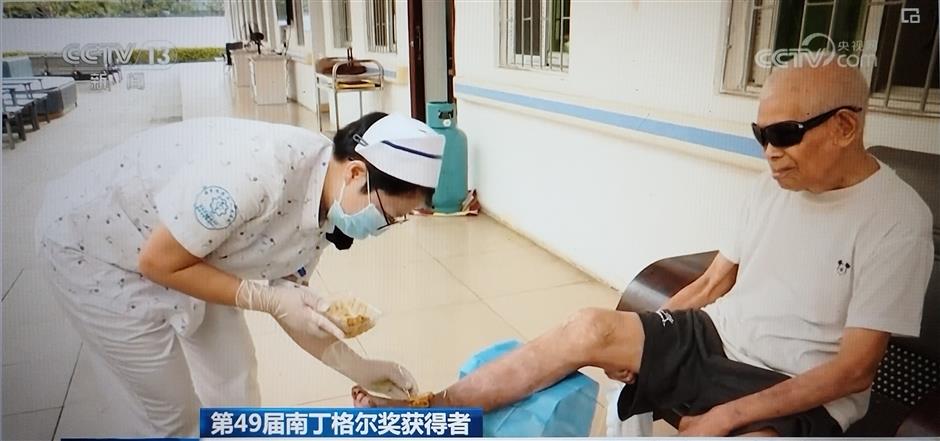Finding our better angels: Indefatigable nurses lead by selfless example
When she graduated with excellent grades from a provincial medical school and went to work as a nurse in a seaside hospital in south China's island province of Hainan in 1995, the then 20-year-old was alarmed by what she saw at first sight.
"Does this look like a hospital?" she asked herself in disbelief on her first day of work 28 years ago. "There's not even a paved road. It's like a deserted place."
What greeted Xing Shaoyun was a vast hospital area whose four major wards were scattered far apart on remote, desolate hills. It would take about one hour to walk from the first to the fourth ward.
"At night, the hospital became all the more quiet and lonely amid the sound of sea waves and sporadic dog barks, " she recalled. "No one dared to walk out of the hospital in the pitch darkness."
As if all these physical challenges were not enough, Xing soon found out that she and her colleagues had to overcome fears – later proved to be unfounded – of contacting leprosy patients.
Over the past 28 years, Xing, head nurse of the Leprosarium of the Fifth People's Hospital of Hainan Province, has treated 256 leprosy patients. At first, both the medical staff and the patients were afraid of possible cross-infection through direct body contact.
"When I just began to work in the hospital, doctors and nurses usually wrapped themselves in protective suits and placed medicines on the ground for the patients to pick up," Xing recalled. "Everyone was afraid of infection."
The fresh graduate wasn't particularly enamored with this seemingly "normal" and "standard" practice, given the limited knowledge about leprosy at that time. In Xing's view, this practice unwittingly drove a psychological wedge between the medical staff and the patients.
"It can't go on like this anymore," she decided finally.
For her, being a nurse meant more than just taking care of the physical health of a patient; it meant psychological communication and mutual respect as well.

Xing Shaoyun (center) and her colleagues treat leprosy patients at zero distance.
So she studied leprosy ever harder, eventually realizing that patients who had recovered from leprosy after standard treatment were no longer contagious. To dispel others' lingering worries, she took the initiative to shake the hands of an elderly patient. Since then, she has led by example in treating convalescent patients at zero distance.
A recent news report in Hainan Daily noted that Xing's courageous handshaking marked a historic shift in the whole province's practice in treating leprosy patients. After the handshaking, more and more doctors and nurses began to take off their heavy protective suits. The psychological barrier that once bothered both the medical staff and the patients was finally removed.

Xing Shaoyun takes care of an elderly patient.
I was born into a doctors' family in the 1960s. All this time I believed – from what I saw and heard – that a nurse's job basically involved giving an injection or distributing drugs to patients in need.
Until I read Xing's story recently, that is. On September 5, she was awarded the Florence Nightingale Medal for her dedication to the psychological, as well as physical, well-being of leprosy patients, some of whom had been hospitalized when they were young.
During the 49th Florence Nightingale Medal Award Ceremony, held at the Great Hall of the People in Beijing, International Committee of the Red Cross president Mirjana Spoljaric praised Xing for having "notably transformed the traditional leprosy nursing model" among other merits.
Xing was one of seven Chinese nurses who were awarded the medal this year. Across the world, altogether 37 nurses were so honored, for their exemplary service or pioneering spirit in public health or nursing education.
Nursing is a profession, whose meaning goes beyond providing required technical services like feeding drugs or giving injections. Xing's story is just the tip of an iceberg of ordinary people doing extraordinary deeds day in and day out, in the belief that one should not just do well, but also do good.

A young nurse donates his hematopoietic stem cells to a patient in need.
On September 12, Xinmin Evening News reported that a 23-year-old male nurse in Shanghai had donated his hematopoietic stem cells to a patient in urgent need.
The nurse's parents at first opposed his donation, citing health concerns. The young man persuaded them by saying: "If I were ill, and only one man in this world could save my life, what would you expect him to do?"
In the bosom of every courageous nurse, there resides an angel. He or she shows – through deeds, not just words – that we can all try to find our better angels.
















